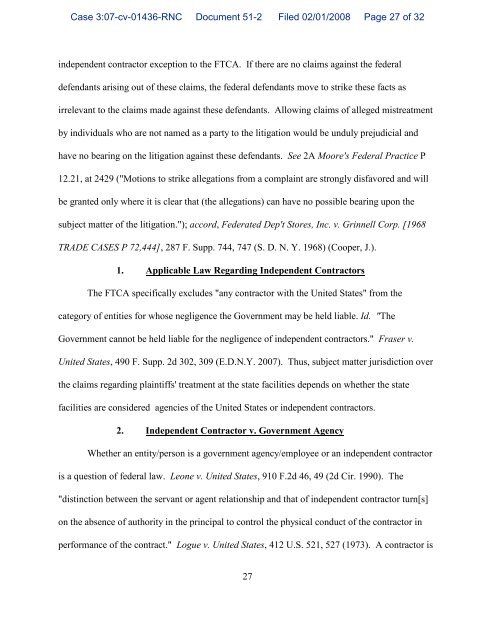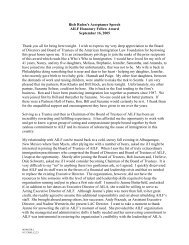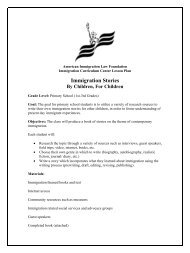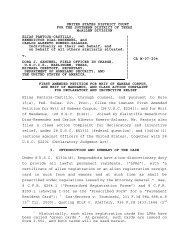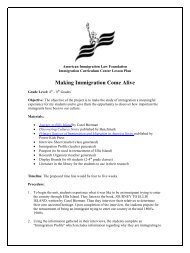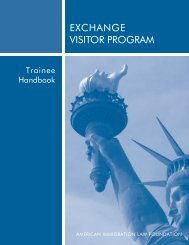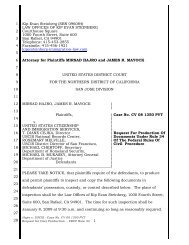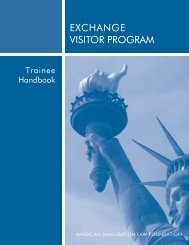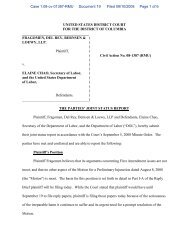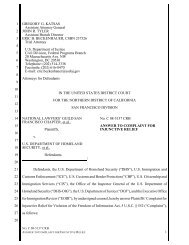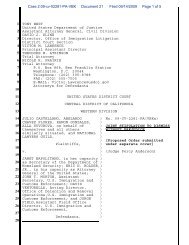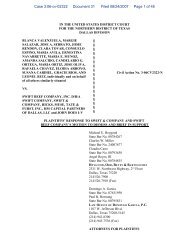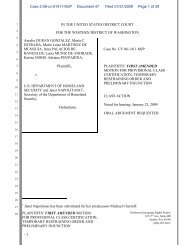Defendants' Motion to Dismiss for Lack of Subject Matter Jurisdiction
Defendants' Motion to Dismiss for Lack of Subject Matter Jurisdiction
Defendants' Motion to Dismiss for Lack of Subject Matter Jurisdiction
- No tags were found...
You also want an ePaper? Increase the reach of your titles
YUMPU automatically turns print PDFs into web optimized ePapers that Google loves.
Case 3:07-cv-01436-RNC Document 51-2 Filed 02/01/2008 Page 27 <strong>of</strong> 32independent contrac<strong>to</strong>r exception <strong>to</strong> the FTCA. If there are no claims against the federaldefendants arising out <strong>of</strong> these claims, the federal defendants move <strong>to</strong> strike these facts asirrelevant <strong>to</strong> the claims made against these defendants. Allowing claims <strong>of</strong> alleged mistreatmentby individuals who are not named as a party <strong>to</strong> the litigation would be unduly prejudicial andhave no bearing on the litigation against these defendants. See 2A Moore's Federal Practice P12.21, at 2429 ("<strong>Motion</strong>s <strong>to</strong> strike allegations from a complaint are strongly disfavored and willbe granted only where it is clear that (the allegations) can have no possible bearing upon thesubject matter <strong>of</strong> the litigation."); accord, Federated Dep't S<strong>to</strong>res, Inc. v. Grinnell Corp. [1968TRADE CASES P 72,444], 287 F. Supp. 744, 747 (S. D. N. Y. 1968) (Cooper, J.).1. Applicable Law Regarding Independent Contrac<strong>to</strong>rsThe FTCA specifically excludes "any contrac<strong>to</strong>r with the United States" from thecategory <strong>of</strong> entities <strong>for</strong> whose negligence the Government may be held liable. Id. "TheGovernment cannot be held liable <strong>for</strong> the negligence <strong>of</strong> independent contrac<strong>to</strong>rs." Fraser v.United States, 490 F. Supp. 2d 302, 309 (E.D.N.Y. 2007). Thus, subject matter jurisdiction overthe claims regarding plaintiffs' treatment at the state facilities depends on whether the statefacilities are considered agencies <strong>of</strong> the United States or independent contrac<strong>to</strong>rs.2. Independent Contrac<strong>to</strong>r v. Government AgencyWhether an entity/person is a government agency/employee or an independent contrac<strong>to</strong>ris a question <strong>of</strong> federal law. Leone v. United States, 910 F.2d 46, 49 (2d Cir. 1990). The"distinction between the servant or agent relationship and that <strong>of</strong> independent contrac<strong>to</strong>r turn[s]on the absence <strong>of</strong> authority in the principal <strong>to</strong> control the physical conduct <strong>of</strong> the contrac<strong>to</strong>r inper<strong>for</strong>mance <strong>of</strong> the contract." Logue v. United States, 412 U.S. 521, 527 (1973). A contrac<strong>to</strong>r is27


